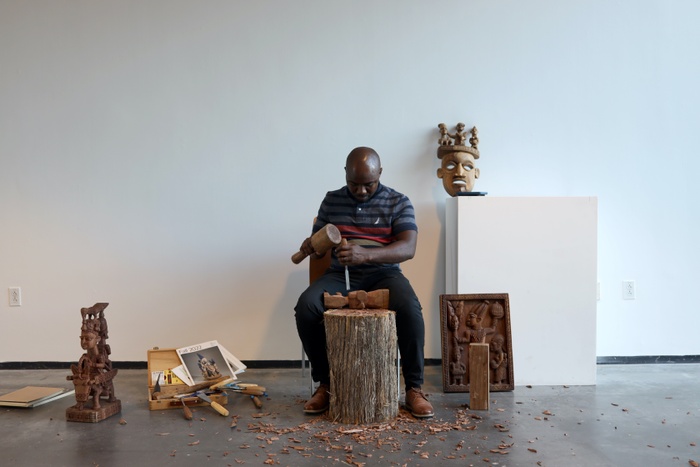

During the Fall 2022 semester, the Yale School of Art welcomed Lukman Àlàdé Fákẹ́ye to a lead a four-day demonstration of carving in the Yorùbá tradition, in collaboration with the Yale University Art Gallery. This visit was made possible through the Gallery’s Hayden Visiting Artists Program, established by Susan and Richard Hayden in 2004. Fákẹ́ye’s community-oriented residency coincided with his participation in the development of Bámigbóyè: A Master Sculptor of the Yorùbá Tradition, the first exhibition dedicated to the workshop of the Nigerian artist Moshood Olúṣọmọ Bámigbóyè, open at the Gallery through January 8, 2023.
Invited by Aki Sasamoto, Director of Graduate Studies in Sculpture and Assistant Professor at the Yale School of Art, alongside Yale University Art Gallery’s curators James Green, Molleen Theodore, and Keely Orgeman, Fákẹ́ye demonstrated his carving process at the School of Art beginning Monday, September 12 through Thursday, September 15, 2022.
Sculptures carved in the Yorùbá tradition are typically completed in distinct stages (sisa, ona lile, ale tunle, didan and finfin) and Fákẹ́ye was invited to complete a work of figurative sculpture in this space over the course of four days. During this time, members of the School of Art community gathered in the open second-floor landing space of 36 Edgewood Avenue, and from 10AM through 5PM had the opportunity to watch Fákẹ́ye at work and ask him questions while he carved. He, in turn, had the opportunity to engage in the daily activities of the Sculpture Department, meeting students and faculty and attending a reception held in his honor.
Lukman Àlàdé Fákẹ́ye is a sixth generation Yorùbá traditional sculptor from the Fákẹ́ye Art Family Dynasty. Since childhood, Fákẹ́ye has served under the tutelage of his father, master carver Akin Fákẹ́ye in Ibadan, Nigeria and has developed and mastered Yorùbá traditional carving techniques. Fákẹ́ye’s passion for the promotion of Yoruba art, history and culture is evident in his work which has appeared in exhibitions globally.
Over the past few years, Fákẹ́ye has worked closely with the Yale University Art Gallery’s curatorial and conservation teams to identify wood species and help interpret the significance of works by Moshood Olúṣọmọ Bámigbóyè. This follows in the footsteps of his uncle, the sculptor Lamidi Fákẹ́ye (1925-2009) who was the first to attribute the Equestrian Shrine Figure in the Gallery’s collection to Bámigbóyè in the 1970s while working with art historian William Fagg (1914-1992).
Fákẹ́ye was co-hosted by the Gallery during his time at the School of Art and invited to events surrounding the opening of the Bámigbóyè exhibition, leading a drawing session in the exhibition. In the Spring of 2022 Fákẹ́ye took part in the online Gallery program “Exploring Yorùbá Woodcarving” and he also taught as part of the Spring 2022 Seminar “The Artist in African Art and the Ethics of Display” with Benenson Associate Curator of African Art James Green.
The Yale School of Art would like to extend its sincere thanks to our Director of Graduate Studies in Sculpture and Assistant Professor Aki Sasamoto, and Benenson Associate Curator of African Art James Green, Associate Curator of Programs Molleen Theodore, and Knox Associate Curator of Modern and Contemporary Art Keely Orgeman at the Yale University Art Gallery, for their work in making this collaboration possible.
The Gallery’s Hayden Visiting Artists Program brings international artists to Yale for an intensive period of interaction with undergraduates, graduate students, and faculty. Visiting artists play a critical role in the arts community at Yale by providing alternative perspectives that can stimulate new ideas and new work, while forging potentially lasting links between artists from different communities. Make sure to catch the exhibition before it closes on January 8!
Editor details
Last edited by: Lindsey Mancini
Edit access: Everybody
Editor details
Last edited by: Lindsey Mancini
Edit access: Everybody
Editor details
Last edited by: Lindsey Mancini
Edit access: Everybody